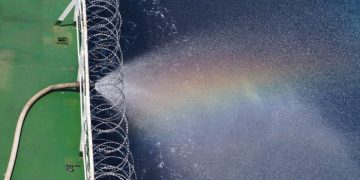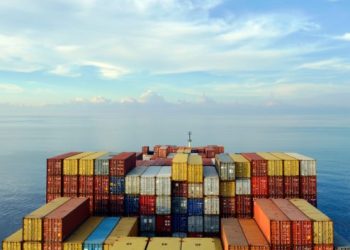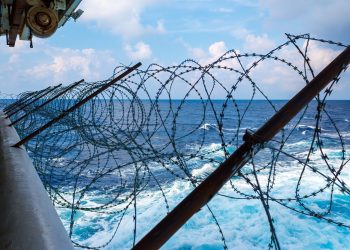While IMO is encouraged by the progress made in many countries to designate seafarers as key workers and facilitate crew changes and repatriation, it remains very concerned about the many countries where restrictions are still in place for seafarers. For this reason, it published a FAQ on crew changes and repatriation of seafarers.
1. Why is it so difficult for seafarers to go home?
Governments around the world have suspended international flights, closed borders, ports and airports and imposed travel restrictions to foreign nationals to limit the spread of the novel coronavirus. Those restrictions have directly impacted the capacity of seafarers to travel between the ships that constitute their workplace, and their country of residence.
The very nature of international shipping makes it necessary for significant numbers of seafarers to travel by plane to and from ships every month, as their ports of departure or arrival may be thousands of kilometres away from their homes.
2. How many seafarers are in this situation?
It is estimated that starting in mid-June 2020, as many as 300,000 seafarers each month will require international flights to enable crew changeovers. About half of them (150,000) will need to be repatriated home by aircraft while the other half will join ships. Additionally, around 70,000 cruise ship staff are currently waiting for repatriation.
On any given day, nearly one million seafarers are working on some 60,000 large cargo vessels worldwide.
3. Why are crew changes so important?
Crew changes are vital to prevent fatigue and protect seafarers’ health, safety and wellbeing – thereby ensuring the safe operation of maritime trade. They cannot be postponed indefinitely.
The duration of seafarers’ contracts varies, but they typically work between four and six months on ships, followed by a period of leave. When at sea, they often work 10-12 hours shifts, seven days a week – performing tasks that require constant professional attention.
Seafarers spending extended periods onboard are more at risk of adverse health effects, including physical and mental health issues.
4. What is the situation regarding access to medical care for seafarers?
There have been several cases of seafarers being denied permission to go ashore to receive medical care, despite presenting medical issues that were urgent but not related to COVID-19.
Such cases create significant concerns for seafarers, who worry they may not get the medical care they need in case they become ill, from COVID-19 or from other diseases. In addition, many seafarers have serious problems in obtaining repeat prescriptions for medication they take.
Under ILO’s Maritime Labour Convention (MLC), port States must ensure that seafarers on board ships in their territory who are in need of immediate medical care are given access to medical facilities on shore. According to ILO, the exceptional measures adopted by some governments to contain the COVID-19 pandemic cannot be invoked as such as a valid reason not to comply with this international obligation.
5. What is IMO doing to help seafarers?
IMO has established a Seafarer Crisis Action Team to monitor developments, coordinate efforts, communicate with all relevant stakeholders and provide targeted support in individual cases and particularly urgent situations.
Moreover, IMO has repeatedly urged governments to designate seafarers as key workers and to exempt them from travel restrictions. It has also issued a number of circular letters providing guidance and key information on issues such as ensuring safe ship crew changes (CL.4204/Add.14), personal protective equipment (CL.4204/Add.15), seafarers certificates (CL.4204/Add.19) and ensuring a safe shipboard interface between ship and shore-based personnel (CL.4204/Add.16). Click here to access all guidance issued by IMO amid the COVID-19 pandemic.
6. What can governments do?
IMO and other organizations have repeatedly urged governments to designate as “key workers” seafarers, marine personnel, fishing vessel personnel, offshore energy sector personnel and service provider personnel at ports, regardless of nationality.
Governments are urged to provide these personnel with the necessary support, such as exemptions from national travel or movement restrictions, to allow them to join or leave ships and to transit through national territories (for example to an airport) for repatriation. They must also ensure these personnel have access to emergency medical treatment and, if necessary, facilitate emergency repatriation.
Governments and national authorities should ensure that all visiting merchant ships continue to have access to berths in port and terminals and do everything possible to allow crew changes to happen. They are strongly encouraged to implement a series of protocols, which set out general measures and procedures designed to ensure that ship crew changes can take place safely during the COVID-19 pandemic.
7. Why is the keyworker designation so important?
This keyworker designation will ensure that seafarers are exempted from travel restrictions and are able to travel to and from ships – a key element in allowing crew changes to take place.
Crew changes are not only essential for the health and wellbeing of seafarers themselves, but they are also vital to ensure commercial ships can continue to carry essential goods safely and without unnecessary interruptions.
8. Should the keyworker designation also apply to seafarers onboard cruise ships?
Yes, IMO’s calls for seafarers to be designated as key workers include cruise ships crew. All seafarers and marine personal are considered essential workers by IMO, regardless of the type of ship they work on. IMO urges governments and national authorities to ensure seafarers working on cruise ships are entitled to the same exemptions as other essential workers, such as permissions for transit and travel.
Cruise ships have faced particular challenges, with much larger numbers of people on board (both seafarers and passengers) compared to cargo ships. They may have thousands of passengers and crew, while even the biggest cargo ships may only have some 20 crew on board.
9. Which countries have designated seafarers as key workers?
As of mid-June 2020, these are: Bahamas, Barbados, Brazil, Canada, Chile, France, Gabon, Georgia, Germany, Ghana, Hong Kong (China), Japan, Korea, Liberia, Moldova, Montenegro, New Zealand, Nigeria, Norway, Panama, Philippines, Romania, Singapore, South Africa, Spain, Thailand, the United Arab Emirates and the United Kingdom.
Many more countries may have designated seafarers as key workers without reporting it to IMO.
10. How can crew changes and repatriation take place safely?
IMO has endorsed a set of step-by-step protocols which set out general measures and procedures designed to ensure that crew changes can take place safely during the COVID-19 pandemic. These protocols have been drawn up by a broad cross-section of global industry associations representing various sectors of the maritime transport industry.
The protocols advice on safe procedures for joining ships as well as leaving ships and repatriation. They cover everything from provision of personal protective equipment (PPE), COVID-19 testing, social distancing, hygiene precautions, temperature checking, temporary accommodation and proposals for designated lanes at airports for seafarers, to name only a few. They also include requirements for shipping companies and recommendations to governments, maritime administrations and other relevant national authorities such as health, customs, immigration, border control, seaport and civil aviation authorities.
11. What does international law say about the right of seafarers to be repatriated?
Regulation 2.5 of ILO’s Maritime Labour Convention (MLC) states that seafarers have a right to be repatriated at the end of their contracts. Under the MLC, flag States have a responsibility towards the right of seafarers to be repatriated and port States have an obligation to facilitate such repatriation as well as the replacement of seafarers. ILO has indicated that these obligations must be respected during the pandemic without prejudice for the need to take measures to prevent contagion.
ILO’s 2006 Maritime Labour Convention (MLC) states that the maximum continuous period a seafarer should serve on board a vessel without leave is 11 months. This period may be exceeded in situations of “force majeure”, but any extension must be accompanied by appropriate safeguards to avoid any abuse and protect seafarers’ rights.






























































Saudi Aramco as a major oil company in the world and in the Saudi Arabia have to take care about 1000 of seamen who get stuck in offshore oilfields due to travel restriction. They have to contact Saudi goverment and advice to make seamen as a key workers same as UAE did and arrange crew change as soon as possible.
Crew changes are vital to prevent fatigue and protect seafarers’ health, safety and wellbeing – thereby ensuring the safe operation of offshore industry. There are some seamen already 13 month on board. This is about life or death. So far no action at all from any body in Saudi about crew change.